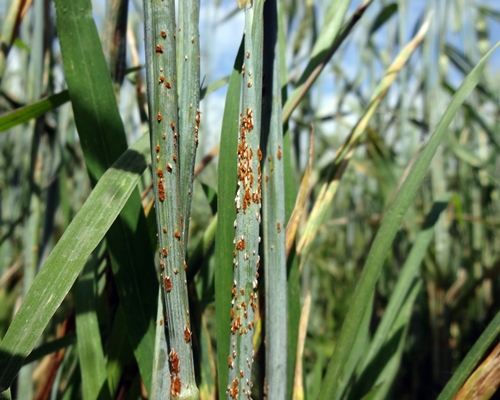26 April 2016. Plant scientists in the U.K. developed genetic engineering techniques that quickly clone resistance to plant diseases affecting wheat, soybeans, and potatoes. The techniques are described in articles appearing in the 25 April issue of the journal Nature Biotechnology (paid subscription required).
Teams from the John Innes Centre and Sainsbury Laboratory in Norwich — with colleagues from academic and industrial labs in the U.S., Australia, Malaysia, and Brazil — are seeking faster and more reliable tools to build resistance to plant diseases in crops, which take high toll on growers’ yields. While disease-resistance traits can be transferred to crop plants, finding resistant genes in large plant genomes and breeding new varieties is a long and laborious process. The alternative for growers in many cases is to use chemicals to kill the blight.
The researchers, led by Brande Wulff at John Innes Centre and Sainsbury Lab, devised a 3-step technique they call MutRenSeq that quickly identifies genes in wild type plants resistant to disease. In their papers, the researchers then apply the technique to develop new blight-resistant varieties in the lab for wheat, soybeans, and potatoes. The authors say this technology can reduce the time for breeding new varieties to 2 years, a process that now takes 10 to 15 years.
The key to the technique is finding a minimal set of genes in wild-type varieties with natural resistance to blight, which in the past was an extended and difficult task. “With MutRenSeq,” says Wulff in a joint statement, “we can find the needle in the haystack: we can reduce the complexity of finding resistance genes by zeroing in from 124,000 genes, to just a single candidate gene.”
MutRenSeq begins with creating mutations in wild-type plants resistant to blight, resulting in a variety without that resistance, using ethyl methane sulfonate, a chemical known for causing genetic variations. The researchers then sequence the genomes of the original wild-type plant and mutated version, followed by matching the two genomes to identify the differences responsible for blight resistance.
The team first applied MutRenSeq to wheat stem rust, a fungal disease that according to 2Blades Foundation, a sponsor of the research, causes devastating epidemics leading to losses of 50 to 100 percent of yields. Using MutRenSeq, the team cloned a variety of wheat with resistant genes Sr22 and Sr45 identified in the genomic analysis, with another resistant gene Sr33. The researchers say Sr33 was already known for its resistance to blight, but scientists were not able before to isolate the two other genes.
Another team used MutRenSeq to develop a variety of soybeans resistant to Asian soybean rust, a fungus that affects soybean crops in North and South America, as well as Asia, causing yield losses of up to 80 percent. Asian soybean rust is so far treatable only with fungicides, and no resistant genes have yet been cloned. The researchers used MutRenSeq to identify a resistant gene, CcRpp1, in pigeonpeas, a close relative, which was cloned into commercial soybean varieties. Lab tests show the cloned variety is fully resistant to Asian soybean rust.
A third team applied the MutRenSeq technique to potato blight, known historically for wiping out the Irish potato crop in the 1840s and still a serious problem for growers. The researchers added single-molecule real-time or SMRT sequencing to their tools to identify the resistant gene Rpi-amr3 in American black nightshade plants, a relative of potato. Rpi genes, say the researchers, are known to be resistant to potato blight fungi, but breeding resistant varieties up to now is difficult and slow. The researchers report successfully cloning a potato variety with the Rpi-amr3 gene.
Institutions and individual researchers filed patent applications for the technologies in these papers.
Read more:
- Gene Editing Enlisted to Fight Citrus Greening
- Crop Disease Images Collected, Available Via Smartphones
- Patent Awarded for Slower Digested Wheat
- Oilseed Plant Engineered for Biofuel, Chemical Feedstocks
- Crop Biotech Acquires Genomic Engineering Technology
* * *


 RSS - Posts
RSS - Posts
You must be logged in to post a comment.